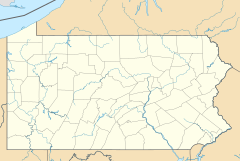Allegheny Mountain (Pennsylvania)
| Allegheny Mountain | |
|---|---|
| Allegheny Ridge[1] | |
 | |
| Highest point | |
| Peak | Grandview Summit, Eastern Continental Divide |
| Elevation | 3,010.3 ft (917.5 m)[2]: a |
| Coordinates | 40°3′29″N 78°45′29″W / 40.05806°N 78.75806°WCoordinates: 40°3′29″N 78°45′29″W / 40.05806°N 78.75806°W |
| Geography | |
 Allegheny Mountain Allegheny Mountain is a northern portion of the range of Allegheny Mountains | |
| Country | United States |
| State | Pennsylvania |
| Counties | Bedford, Cambria and Somerset |
| Parent range | Ridge-and-Valley Appalachians of the Allegheny Mountains |
| Geology | |
| Orogeny | Alleghenian orogeny |
| Type of rock | Carboniferous[3] |
 Eastern Continental Divide points of Allegheny Mountain (Pennsylvania) | |
Allegheny Mountain is a stratigraphic ridge that extends northeast to southwest from south of Blue Knob (Pennsylvania)[specify] to a saddle point at the Savage Mountain anticline. It merges with Negro Mountain just north of the Cambria County line where the Berlin-Salisbury basin expires [1].
- Eastern Continental Divide (ECD)
- The ECD enters Allegheny Mountain south of and follows the Allegheny Backbone [2] southwest where it leaves the escarpment toward the saddle point to the southeast between headwaters of Flaugherty and Wills Creeks, at which the ECD enters the Savage Mountain anticline.[3]
| wikiarticle | west valley | summit or other point | east valley |
|---|---|---|---|
| Northern terminus | [specify] | ||
| Fraziers Pass[clarification needed] | 2,180 feet (660 m) (Stonycreek River) | 3,010.3 feet (917.5 m)40°3′29″N 78°45′29″W / 40.05806°N 78.75806°W (Grandview Summit) | 1,100 feet (340 m) (Juniata River) |
| US Route 30 | 2,580 feet (790 m) (Breastwork Run) | ||
| summit | 2,801 feet (854 m)[verification needed]39°58′38″N 78°50′16″W / 39.97722°N 78.83778°W (summit) | ||
| summit | 2,795 feet (852 m)[verification needed]39°57′48″N 78°50′50″W / 39.96333°N 78.84722°W (summit) | ||
| Pennsylvania Turnpike | 2,220 feet (680 m) (Stonycreek River) | 2,690 feet (820 m)39°57′41″N 78°51′24″W / 39.96139°N 78.85667°W (summit) Allegheny Mountain Tunnel | |
| Chambersburg and Pittsburgh Survey[4] | 2,580 feet (790 m)39°57′13″N 78°50′32″W / 39.95361°N 78.84222°W (Deeter Gap) | ||
| Raystown Branch Juniata River | Buffalo Creek | 2,889.6 feet (880.8 m)39°54′48″N 78°53′16″W / 39.91333°N 78.88778°W (triple watershed) | 1,260 feet (380 m) (Little Wills Creek) |
| Savage Mountain PA[5] | 2,667 feet (813 m)39°53′11″N 78°44′10″W / 39.88639°N 78.73611°W[6] | ||
| Allegheny Backbone | 2,830 feet (860 m)39°49′25″N 78°58′10″W / 39.82361°N 78.96944°W (summit) southmost ECD summit on Allegheny Mountain (Pennsylvania) escarpment | ||
| Baltimore & Ohio Railroad | 1,940 feet (590 m) Casselman River @ Flaugherty Creek | 2,430 feet (740 m)39°48′30″N 78°57′27″W / 39.80833°N 78.95750°W[5] (saddle point) | 900 feet (270 m) Wills Creek @ Little Wills Creek |
References[]
- ^ DeFebo, Michael. "Improving the Roadway Turnpike Considers Tunnel Options". PATurnpike.com. Archived from the original on 2011-09-28. Retrieved 2009-11-28.
- ^ "GISDATA Map Studio". United States Geological Survey. Archived from the original on 2010-02-18. Retrieved 2009-12-09.:a. "USGS Elevation Web Service Query". Retrieved 2009-12-03.[permanent dead link]: 1) Y_Value=40.058056&X_Value=-78.758056 ... 3010.25951315412 Archived 2011-07-22 at the Wayback Machine:b. quadrangle maps, 1:24,000, 7.5-Minute Series (Topographic): 1) Berlin, Pennsylvania, 2) Cumberland, Maryland-Pennsylvania-West Virginia
- ^ Stevenson, J. J (1882). The Geology of Bedford and Fulton Counties. Second Geological Survey of Pennsylvania: Report of Progress Volume 2. Board of Commissioners for the Second Geological Survey. p. 95. Retrieved 2009-12-06.
- ^ Hage, Hother (1839). Report of Hother Hage Chambersburg and Pittsburgh Survey. Simmons-Boardman Publishing Corporation. p. 113. Retrieved 2009-12-04.
- ^ Jump up to: a b Google Maps, Maps.Google.com Savage Mountain (PA), Sand Patch Tunnel, Little Savage Mountain
- ^ "Mountain Peaks and Summit Names". MountainPeaks.net. Retrieved 2009-11-29. Savage Mountain PA
Categories:
- Allegheny Mountains
- Ridges of Pennsylvania
- Ridges of Bedford County, Pennsylvania
- Landforms of Somerset County, Pennsylvania
- Landforms of Cambria County, Pennsylvania
